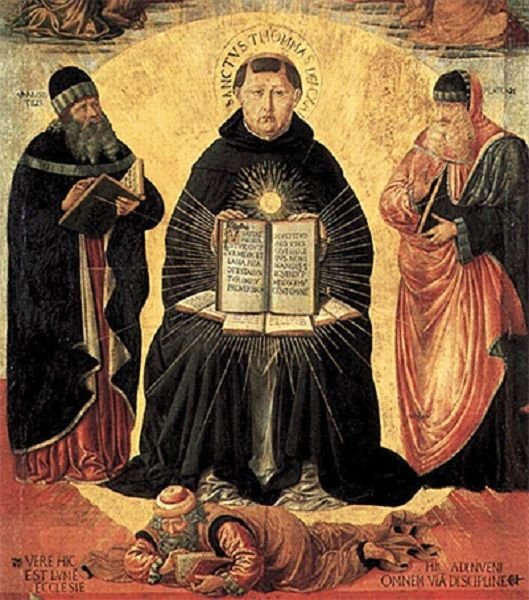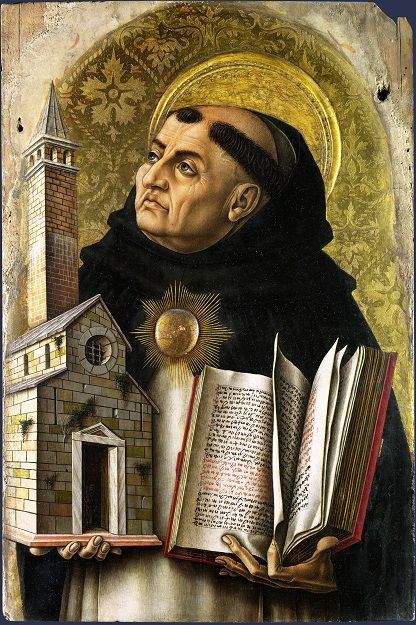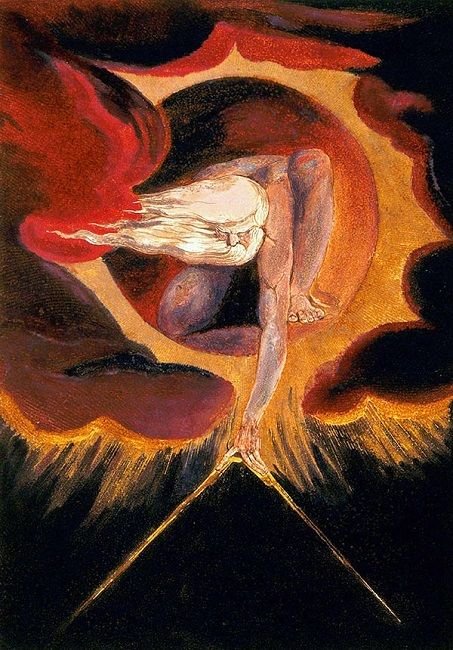Revival of neo-thomism
Neo-thomism is the philosophical doctrine of the Catholic Church. This philosophy is supported by the Vatican in all Catholic high schools. At present, neo-thomism is the only philosophical doctrine that does not experience the crisis characteristic of all other philosophical teachings of the 20th century. Neo-thomism is the only philosophical doctrine that has the longest history - 8 centuries. Neo-thomism recovers one of the significant philosophical teachings of the Middle Ages - the teachings of Thomas Aquinas (Thomas of Aquino). Medieval philosophy directly inherited the ancient, its problems, but not its decisions. Ancient philosophy explains the world to itself, in disown it prevents other interference in the explanation of the phenomenon from the outside world. The first stage of the existence of medieval philosophy is marked by the problems of the meaning of human life - God exists in man and there he has to be sought out and found. In the 11th and 12th centuries of the New Age, there was a sharp change in the interest of philosophy - instead of man, God's being was searched in the universe, the cosmos. This interest imperceptibly for several centuries has led to the emergence of science. In the first period of medieval philosophy characteristic of his orientation towards man is associated with the names of the Fathers of the Church - Tertullian, Augustine, etc. In the second stage of the church, when the interest of its philosophy turns to space and is not more interested in the construction of the world than in the spiritual beginning of man, two powerful philosophical ideas are formed - one presented by Thomas Aquinas and the other by D. Scott.

Formation of neo-thomism
The idea of creating a new philosophical teachings of the Catholic Church arose in the middle of the 19th century. In the 16th and 17th centuries, the Catholic Church no longer has its own philosophical doctrine. Its ideological impact is realized only by Catholic theology. 200 years this was possible, because public problems did not require religious philosophical solutions. During the French Revolution and thereafter until the middle of the 19th century, the Catholic Church experienced a very serious ideological and moral-political crisis. European society itself is sharply changing its way of life. In response to the spread of neo-thomism and the radical political ideas of liberalism, socialism, anarchism, communism, the Catholic Church is taking action to create its own philosophical teachings. The proclamation of the new teachings, historically and ideologically based on Thomas Aquinas' philosophy, was to be proclaimed at the first Vatican Council, designated for the 1870s. A document, "The Dogmatic Constitution of the Catholic Faith," was prepared, but during the congress the message of a war broke out between Prussia and France. The meeting was interrupted, and thus the attempt to formalize the new philosophy was postponed. The second attempt to legalize the Neuthomotism was carried out in 1879. Pope Leo 13 signed a circular under the name Etter Patris (the eternal fathers) - a school subject for secondary schools. In order to become a subject of study in the official philosophy of Catholicism, neo-thomism was to be legitimized by a special act of the Vatican. The document is titled "The 24th Thomist". This act was adopted on July 27, 1914. and after 4 days the First World War began. Gradually, philosophical centers are formed, where neo-thomism will be studied. The most prestigious is the Institute in the city of Louvre near Brussels, Rome, a Catholic institution in Milan, Paris, etc.

General philosophical expressions of neo-thomism.
The first task of the new doctrine was to outline the boundaries of theology, but it remains a religious doctrine for God and God's being. And the religious philosophy of Catholicism studies everything that exists between man and God. Moving on the soil of philosophy, the neo-thomism lists the eternal problems of philosophy. This philosophy must very clearly recognize the clear distinction between faith and knowledge. In the Middle Ages (late stage), the church has committed a fundamental mistake that opposed the mind of faith. Indeed, according to neo-thomism, such opposition does not exist and should not exist. Differences are the source of faith and knowledge. The source of faith is revelation, and knowledge - reason. Reason is a basic tool of human knowledge. Sense of knowledge is limited and very common and unreliable. Thus, neo-thomism from the very beginning is oriented to rationalism and puts it at the basis of its theory of knowledge. Besides, the world is fully known, and man and the world are created by the same higher being. By reason, man is gifted with the ability to fully know the reality around him and be able to use it. Neo-thomism also adopts one of the principles of realistic philosophy, namely, that the world exists objectively and independently of human knowledge. So one of the fundamental principles of the 24th of neo-thomism is the principle of rationality. Raising reason as a basic tool of knowledge, neo-thomism creates a condition for the formation of a particular kind of psychology. Human reason is a fragment of divine intelligence. It exists in the body of man, but it is actually the relationship between the individual and God. When one examines his mind, he, by analogy, makes a conclusion about the essence of divine reason. Thus in psychology, based on neo-thomism, human emotions, the effects limit the cognitive abilities of reason. They are interpreted as something negative. Thus, from the nasopharyngeal position, rationalism becomes a moral approach. Underestimating the role of affects does not affect belief. It is an organizing factor for the soul of man, and the soul is the psyche in its absolute fullness. Spirit - soul; reason - emotions; rationalism - sensory knowledge; rational and intuitive perception of the world.
The ontology of neo-thomism
Neo-thomism is self-perceived as a realistic philosophical doctrine, following its original source (the teachings of Thomas Aquinas), neo-thomists offer an extremely complex system of being. Absolute, regardless of being, is the very existence of God. It is eternal and is not created by anything, everything stems from God's being. Along with this, the absolute being also has another that is created and dependent, it is defined as the existing one. The created being is divided into two components - essence and existence. This division stems from Aristotle's philosophy and constitutes one of the eternal problems of philosophy. The problem is what determines and what determines. According to neo-thomism, the essence of man created and put into it by God determines his way of life, his moral, cognitive, and psychic behavior. Thus, the psychology of neo-thomism excludes any determinant influence of external factors on the inner essence of man and his behavior. Man gets his psychological device at birth and no external influence can change it. Man is as he is by birth, not as a result of the influence of social practice and the world around him. From this psychological postulate also derives the moral rule: man bears full responsibility for his actions and can’t explain his actions as a result of insurmountable external influences.

The knowledge theory of neo-thomism
Neo-thomism is a realistic philosophical doctrine => the most important philosophical discipline in it is the doctrine of being - ontology. The principles of cognition theory are then derived from the objective structure of being. According to neo-thomism, there are two realities. One - the reality of the absolute being (the being of God) and the other - the world of the created being (the being of the material world). These two ontologies of the two realities suggest the existence of two theories of knowledge. Neo-thomism divides two types of knowledge: knowledge of principles and knowledge of objects. This means that one determines the character of the cognitive process, first of the fundamental rules that we know of the outside world and which derive from the very nature of our reason. Knowledge of objects depends on the nature of these objects themselves: one is the knowledge of material processes, another is the knowledge of the mental or emotional phenomena, the ultimate goal of knowledge is the knowledge of God. Knowledge is also divided on the characteristic of its realization - there is supernatural knowledge that does not obey logical rules, but it also has a natural knowledge that fully complies with the requirements of logical consistency. Religion provides supernatural knowledge, and it is through revelation. Revelation itself is a sudden act of assimilation of the truth in its entirety. On the other hand, the natural type of knowledge has graduation. The highest form of natural knowledge is provided by philosophy, as it accepts the objects, phenomena and processes in their universality. A lower degree of natural knowledge is scientific. It is limited by the empirical specificity. Scientific and philosophical knowledge have the ultimate goal of proving that there is a God that God actually exists. The task of theology is to show what God really is.
In his theory of cognition, neo-thomism faces a serious problem. It is easy to understand how limited the volume and perimeter of activity a person knows a limited, material, created world, but it is inexplicable how limited a person can know the eternal unlimited life of God by analogy. Knowledge by analogy is mediated, God has created all nature, including man himself. He has created them by their logic and will, which has inevitably impressed them; knowing everyone around us, which is the result of the creative role of the artist. By analogy, we know what God is. The neo-thomists divide the knowledge into several degrees - the highest is the intuitive knowledge, through which we know God - directly and beyond, the material world; through intuitive knowledge, we are entering another dimension of being - the dimension of eternity. Rational knowledge - knowledge through reason is knowledge through the logical consistency of reasoning. They are usually related to the law of language. Whether the language is the absolute and necessary product of reason, or whether things are back, or what the language is like is the reason. But there is also a third option, namely that between the language and the thinking the connection is further developed; these are two different realities (language and thinking) that unite in the process of forming the child's psyche and become inseparable after a certain period of his or her age. This problem results directly in the psychology of neo-thomism, according to which thinking is primary, it is largely independent of the language and rules of its construction. The lowest degree of knowledge - the sensory knowledge, it is limited.
I agree with you that neo-thomism is the only philosophical doctrine that has the longest history.
Downvoting a post can decrease pending rewards and make it less visible. Common reasons:
Submit
And the books of St. Thomas Aquinas are the longest volumes I've ever read :D
Downvoting a post can decrease pending rewards and make it less visible. Common reasons:
Submit
I will have to read them too
Downvoting a post can decrease pending rewards and make it less visible. Common reasons:
Submit
good job friend
Downvoting a post can decrease pending rewards and make it less visible. Common reasons:
Submit
Thank you :)
Downvoting a post can decrease pending rewards and make it less visible. Common reasons:
Submit
Beautiful artical post.thanks for shareing
Downvoting a post can decrease pending rewards and make it less visible. Common reasons:
Submit
You are welcome :)
Downvoting a post can decrease pending rewards and make it less visible. Common reasons:
Submit
good article :) keep up the good work as usual. loved reading it. thanx for sharing .
Downvoting a post can decrease pending rewards and make it less visible. Common reasons:
Submit
Thanks for the comment :)
Downvoting a post can decrease pending rewards and make it less visible. Common reasons:
Submit
You got a 8.44% upvote from @buildawhale courtesy of @godflesh!
If you believe this post is spam or abuse, please report it to our Discord #abuse channel.
If you want to support our Curation Digest or our Spam & Abuse prevention efforts, please vote @themarkymark as witness.
Downvoting a post can decrease pending rewards and make it less visible. Common reasons:
Submit
Catholic Church is a intersting place and u write all the information abaout it. i hope this post is helpful for everyone.all peaople are know clearly about Catholic Church form this post.thank you.stay blessed.@godflesh
Downvoting a post can decrease pending rewards and make it less visible. Common reasons:
Submit